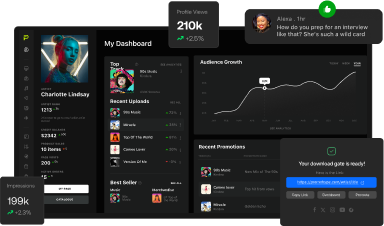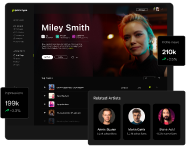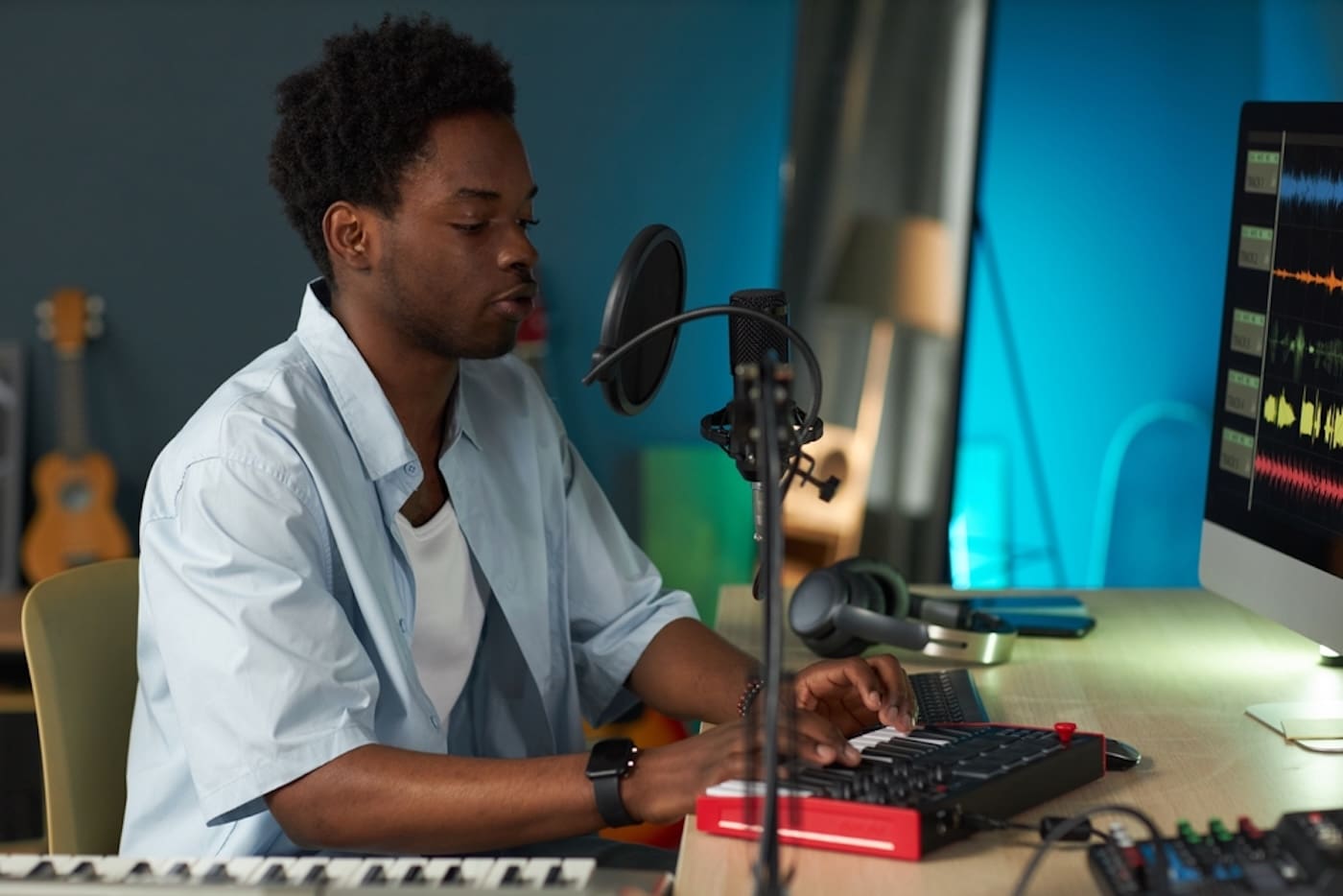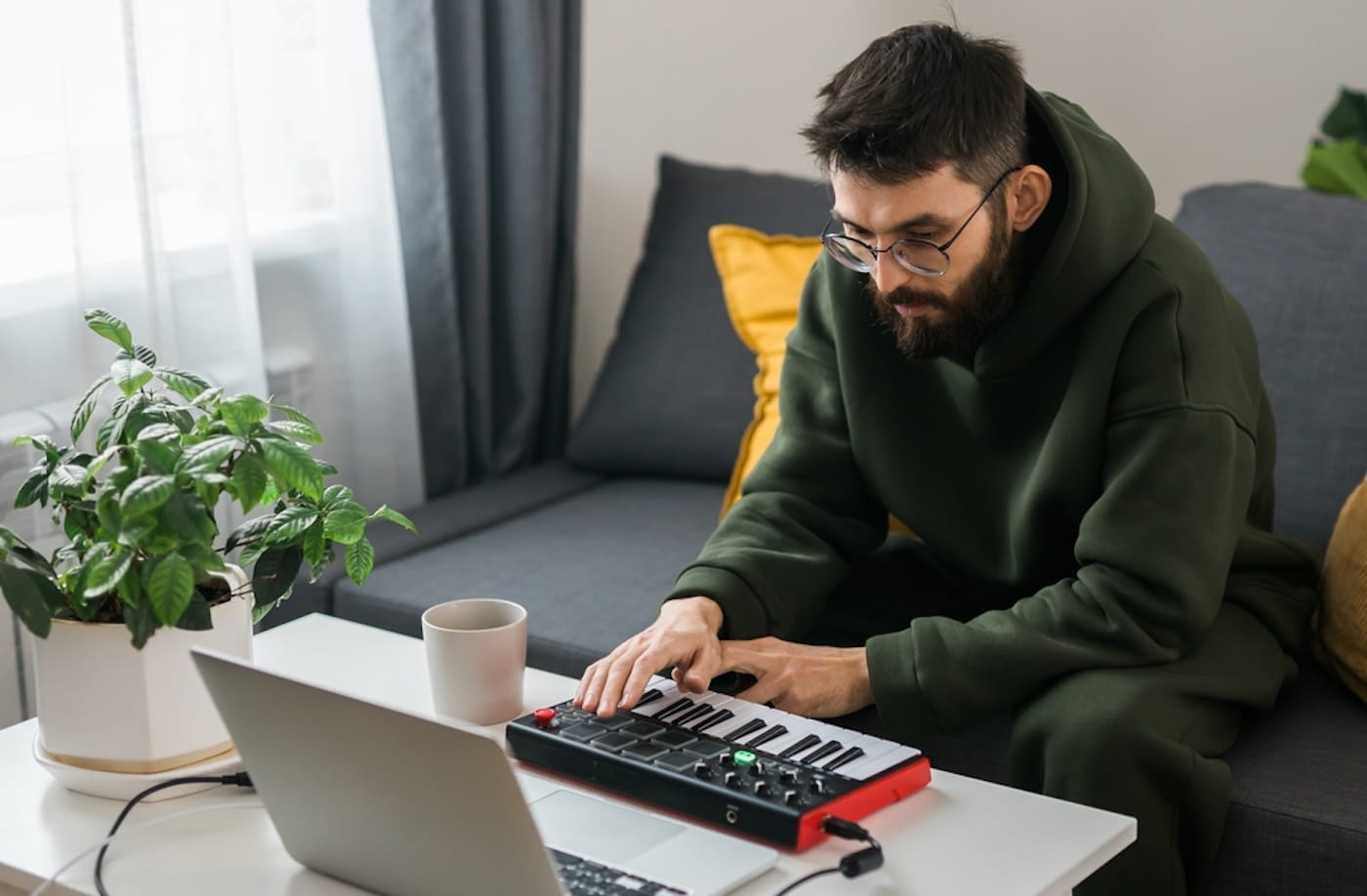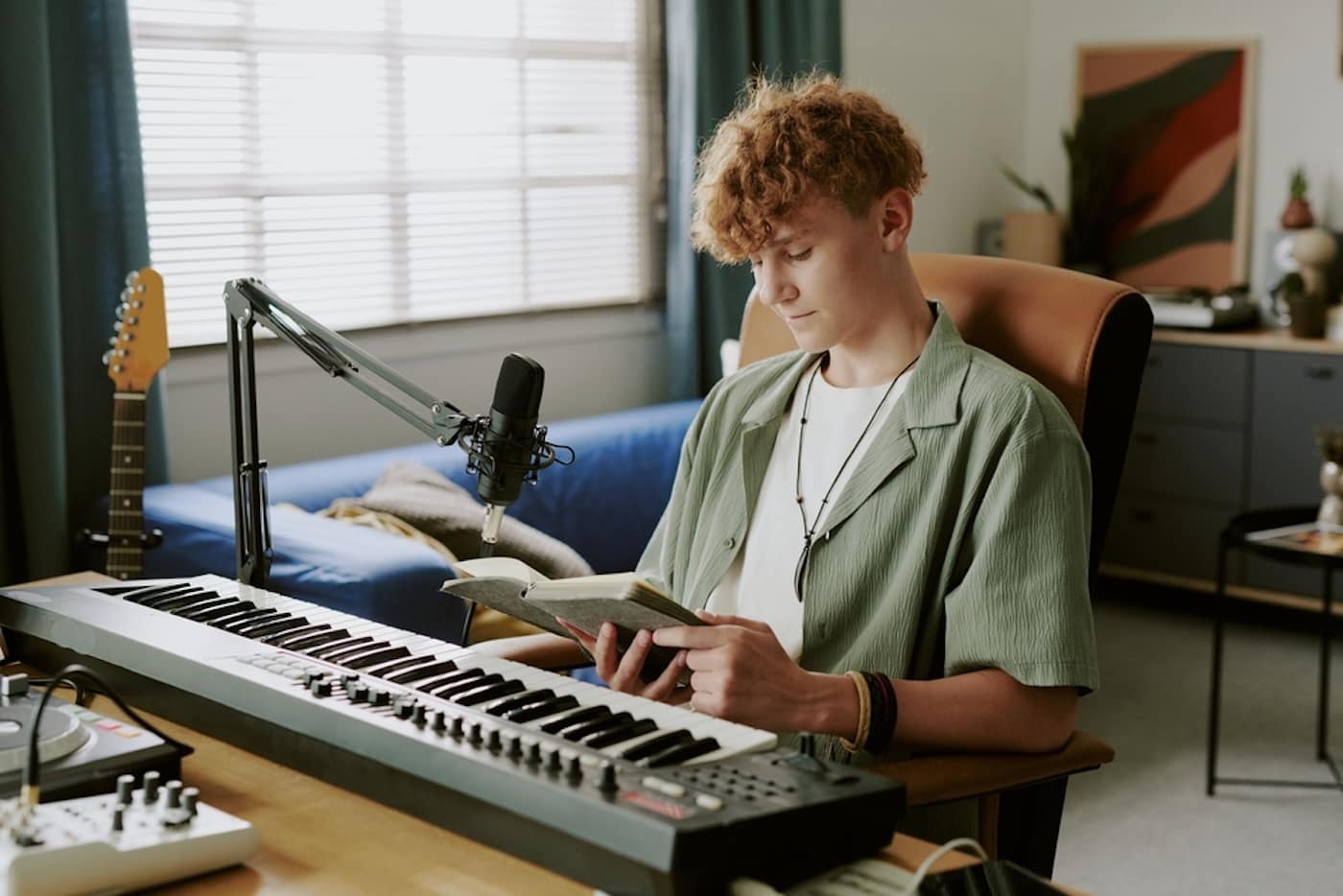
Breaking into the music industry can be challenging for independent artists, but music publishing presents numerous opportunities for success.
Securing a music publishing deal enables artists to reach significantly larger audiences and access valuable resources for promotion.
This guide provides a comprehensive overview of music publishing, covering everything from negotiating deals to royalty streams and sync licensing.
Get Early Access
To Promo Hype
Music Publishing 101: What It Is & How It Works In 2025
Whether you’re a solo artist or an electronic music producer, landing a publishing deal can transform your career prospects.
Here’s everything you need to know about music publishing, from the basic concept to how it works for artists.
What Is Music Publishing?
Music publishing is the process of promoting and monetizing musical compositions, generating revenue opportunities.
Revenue from royalties and licensing deals is then distributed to those responsible for making music, such as songwriters and composers.
Acting on behalf of the songwriters to protect their compositions, music publishers also help with copyright and intellectual property management.
Additionally, music publishing incorporates comprehensive marketing strategies that connect artists with other talent in the music business.
With the industry forecasting strong growth, understanding how it works is crucial for independent artists seeking a deal.
Types Of Music Publishing Companies
Before we break down the role of music publishers in more detail, it’s crucial to understand the various types of publishing companies.
Here’s an overview of the principal types of music publishing companies to be aware of:
- Major publishers: These publishers have a global reach, controlling millions of songs written by thousands of songwriters and composers. The “Big Three” in this category are Sony Music Publishing, Warner Chappell Music, and Universal Music Publishing Group.
- Major-affiliated publishers: Independent publishers that partner with majors are classed as major-affiliated publishers, which are run as independent operations. These publishers will leverage resources and tools commonly used by major publishers, such as royalty collection systems and administrative tools.
- Independent publishers: With their self-funded model and internal administrative processes, independent publishers often cater to niche music genres. They’re usually more flexible than larger companies, with a personalized approach to working with independent artists.
- Writer-publishers: Singer-songwriters who manage their own publishing and retain complete control are classified as writer-publishers. This self-managed approach ensures 100% retention of income, but requires additional time and resources to manage the business.
Understanding how these types of publishing companies operate ensures you approach those that best match your requirements.
Read more: How to submit music to radio stations.
The Role Of Music Publishers
Music publishing companies primarily focus on promoting songs and collecting royalties for signed artists.
There are, however, additional roles and responsibilities that music publishing companies undertake, such as:
- Administration and legal protection: Music publishing encompasses various aspects of administration related to copyright ownership, intellectual property, and royalty payments. They handle registration with collection societies and other legal and administrative tasks.
- Artist & Repertoire services (A&R): Many publishers invest considerable time and money into scouting new talent at gigs and festivals. This allows them to connect artists for potential collaborations on music projects and upcoming tours.
- Negotiating rights: With deep connections in the music industry, publishers ensure artists secure the best possible deals when licensing their music. This can include competitive advances and terms of agreement, as well as access to global markets.
These responsibilities ensure that artists have complete protection of their creative works while maximizing revenue opportunities.
Music Publishing Companies Vs. Record Labels
Music publishing companies and record labels are sometimes confused, but there are key differences between them to be aware of.
While successful independent artists frequently work with both, their responsibilities and focus have distinctions, including:
- Copyright ownership: Music publishing focuses on the control and exploitation of song copyrights, encompassing both the composition and lyrics. Record labels, on the other hand, own the sound recording copyright, relating to the specific recorded version of a song.
- Promotion and marketing roles: Working with a music publishing company ensures that songs are promoted to other musicians and industry professionals. For record labels, this marketing focuses on promoting releases to the public in both physical and digital formats.
- Artist brand and image: When it comes to building an artist’s brand and developing their career, record labels play a dominant role. They work with artists to build a fan base, promote them on social media, and arrange interviews.
In many cases, artists will have separate deals with a label and publisher based on the aforementioned copyright ownership.
Related read: The top 10 record labels looking for artists.
Intellectual Property: Composition Vs. Master Copyrights
The topic of copyright ownership and its relationship to intellectual property is central to the relationship between music publishers and songwriters.
Let’s examine the role of the composition copyright and the master copyright owner, and how it affects royalties paid.
Composition Copyright
The first type of copyright is the composition copyright, which offers legal protection for the original song structure.
This encompasses all aspects, including the melody, rhythm, and harmony, as well as the types of chords used in the arrangement.
Asserting a composition copyright ensures exclusive rights to the writers and composers to use their work in various ways.
This covers everything from the reproduction and distribution of the work to its live performance and use for other derivative works.
Songwriters gain automatic protection, becoming the copyright owner of the composition once a tangible medium has been produced.
Master Copyright
The master copyright holder is distinct from the composition copyright holder, based on the specific sound recording of a song.
As such, the owner is responsible for recording the music, with specific benefits related to monetizing that content.
This individual is often associated with a record label, managing the recording studio, and overseeing the mixing and mastering of the final song.
They are allowed to license the recording for use in other media, while also controlling the distribution and use of that recording.
If you’re an independent recording artist who funded your productions, you will retain ownership of the master recording.
Understanding Publishing Deals
Acquiring a publishing deal enables songwriters and music producers to make money through a revenue-sharing arrangement.
Let’s break down the different types of publishing deals and how each affects payment splits and responsibilities.
Music Creators Vs. Publisher’s Share
Music publishing deals can vary depending on the individual circumstances of each artist, with a 50/50 split the most common arrangement.
The artists typically receive their share directly, based on royalties generated through various types of performance.
While the best music producers can land more favorable deals, negotiation is still recommended when striking a deal.
Once you achieve commercial success and secure airplay on radio stations, you can renegotiate contracts for more favorable terms.
The type of deal also influences the management and distribution of shares in various ways, which we’ll cover next.
Full-Publishing
Under the terms of a full-publishing deal, the songwriter transfers all of the ownership rights and copyright to the music publisher.
In exchange, they can access an advance payment from the publisher, which ties into various ongoing royalties.
Any upfront payments to artists must be recouped through sales and licensing deals before standard royalties are paid.
Since the publisher has been granted exclusive rights to administer content, they can assist with collaborations with other artists.
Publishers will also offer financial support to artists, nurturing their creative development and access to music production resources.
Major artists can secure highly lucrative publishing deals, particularly when they have extensive back catalogs of music available.
Co-Publishing
Once you’ve started producing music like a pro, you may decide that balancing responsibilities with a publisher is your best option.
Co-publishing enables publishers to share in the ownership of the composition copyright, in exchange for providing services and advances.
This allows writers to retain their entire share, along with 50% of the publisher’s share, for a total of 75% of the copyright income.
Under a co-publishing deal, artists can access the same level of services as their full-publishing counterparts.
Access to resources, such as recording studios and industry connections, is available to foster the artist’s career.
This co-ownership arrangement serves to motivate the publisher further to seek out consistent revenue opportunities.
Independent artists considering this publishing style should be clear about the contract, including the duration and relevant terms.
Publishing Administration
With a music publishing administration deal, songwriters can retain complete ownership of their music, including its use and distribution.
This arrangement scales back the publisher’s role to managing administrative tasks on behalf of the artist.
One of the primary administrative tasks in this deal is registering creative works with the relevant performance rights organizations.
This includes processing the paperwork for registration and continues through the collection and distribution of royalties.
For these services, the publishing company will charge a fee of between 10% and 25%, with additional potential fees.
Since publishers don’t adopt any copyright ownership, it’s an appealing option for artists seeking to maintain their independence.
Get Early Access
To Promo Hype
Types Of Music Publishing Royalties
The collection of music royalties is a key factor in securing a publishing deal, as various royalty streams are available.
Here’s a breakdown of the main types of royalties, including public performance royalties, mechanical royalties, and sync licensing deals.
Public Performance Royalties
Earning performance royalties comes through a variety of outlets, occurring whenever music is publicly performed.
This encompasses a variety of venues, including bars, restaurants, shopping malls, and a range of other platforms.
Airplay on radio stations generates performance royalties, along with any live concerts and performances on streaming services.
If you have a publisher, they are responsible for collecting and distributing royalties paid from the relevant performance rights organizations.
These organizations also take a fee for their services, dividing the total royalties between the songwriters and publishers.
Mechanical Royalties
Songwriters can also earn money through mechanical royalties, which pay out based on physical sales and digital downloads.
Distinct from sound recording royalties, mechanical royalties are paid directly to songwriters and publishers through a mechanical society.
They are triggered for each physical sale and can also be generated when music is streamed on platforms such as Spotify and Apple Music.
When collecting mechanical royalties, it’s essential to ensure that your metadata is up-to-date and accurate.
This includes implementing the correct ISRC codes and providing the song’s information to the collection society.
In most publishing deals, these processes are handled by the publisher, who liaises with the collection society on behalf of the artist.
Sync Royalties & Licensing
Another common approach to monetization for artists is through sync licensing deals and the use of music in specific content.
Publishers leverage their industry connections to access various sync opportunities, including those for movies, TV shows, and commercials.
Unlike mechanical and performance royalties, sync licensing can include an upfront one-time fee paid to the rights holders.
Such deals can provide artists with significant exposure, particularly when the song is licensed for a major movie or television series.
Sync licenses are commonplace for generating royalties for major artists and are a key feature of the entertainment industry.
In addition to generating royalties for the composition copyright holder, they also provide money for the master recording owner.
Learn more: How to trademark a band name.
Essential Music Publishing Organizations
In addition to publishing companies, other notable organizations support various processes to help songwriters and publishers succeed.
Each of these organizations plays a unique role in the industry, and can be used in combination to maximize revenue opportunities.
Here are some key organizations connected to music publishing, from royalty collection societies to platforms for independent artists.
Performance Rights Organizations
To collect royalties from public performances, artists and publishers must work with performance rights organizations.
These organizations represent composers, songwriters, and publishers by collecting royalties whenever music is broadcast and performed.
Licensing music users, such as bars, streaming platforms, and radio shows, obtain licenses from PROs to access music to use publicly.
Different performance rights organizations are available depending on the territory in which music is being distributed.
In the United States, the American Society of Composers, Authors and Publishers (ASCAP) is widely used for collecting performance royalties.
Another option for collecting performance royalties is Broadcast Music, Inc., which represents over 22 million works across multiple genres.
Such organizations implement robust systems to track music usage by licensed users, determining royalties based on the overall number of plays.
Despite controversy between music rights groups, they remain critical to the collection of performance royalties for artists and publishers.
Mechanical Rights Organizations
The collection of mechanical royalties bears a substantial similarity to performance royalties, albeit using different collection societies.
In this case, these societies are responsible for tracking, collecting, and distributing royalties based on physical media sales and digital downloads.
The principal mechanical royalties collection society in the United States is the Mechanical Licensing Collective.
Created as a result of the Music Modernization Act, this society implements a rigid assessment of music use in the relevant formats.
These protocols are designed to ensure that songwriters and publishers are fairly compensated for the reproduction of their work.
It’s essential to be aware of some crossover between mechanical royalties and performance royalties when it comes to streaming platforms.
This crossover enables artists to receive both types of royalties from their work whenever it is streamed online.
Additional collection societies for mechanical royalties are available outside of the United States for artists with international distribution.
In the United Kingdom, there’s the Mechanical-Copyright Protection Society, which is a part of the PRS for Music organization.
There’s also the BIEM International Mechanical Rights Organization, which represents artists and publishers in multiple regions.
Publishing Administration Companies
While songwriters with publishing deals can use the aforementioned collection societies, there are other methods for collecting royalties.
This includes working with a dedicated publishing administration company to distribute popular music genres worldwide.
Such partnerships transfer the administration and registration of music, which the administration company then manages.
Licensing requests are also handled by the publishing administration company, with financial reports provided to the artist.
The arrangement allows artists to retain 100% of copyright ownership in exchange for a small monthly subscription fee to the platform.
It’s an agreement that many independent artists opt for, since it allows them to retain a high degree of flexibility and creative control.
This includes exploring marketing and promotion strategies independently, with no restrictions on the evolution of musical styles.
How To Get A Music Publishing Deal
If you’re an artist or music producer looking to land a publishing deal, there are steps you can take to improve your chances.
These steps can also help you get signed to a record label, building contacts in the music industry to unlock new opportunities:
- Promote your music: Generating a buzz and building a fan base doesn’t happen overnight, so promoting your music is crucial to capturing attention. You can set up an artist website and use live performances to promote your previous and new releases.
- Record a high-quality demo: While it would be great if an A&R scout happened across your performance, for most artists, landing a deal requires a proactive approach. This means building a recording studio to create high-quality demos that showcase your style and production skills.
- Collaborate with other artists: As with other entertainment industries, the music industry is as much about who you know as your artistic abilities. By collaborating with other artists, you can expand your business network while also strengthening your catalog.
- Network on social media: Social media and music are closely intertwined, with music business professionals all on X and other platforms. While it’s a challenge to go viral on TikTok, networking with employees from publishers costs nothing and can pay huge dividends.
- Negotiate your contract carefully: Once you’ve proven your value to a music publishing company, it’s time to negotiate the deal. Be absolutely clear on the terms and leverage for a better deal, seeking professional advice whenever possible.
By creating a shortlist of preferred publishers and learning from feedback, you can increase your chances of securing a deal.
Read this next: The best music distribution services.
The Future Of Music Publishing
The music industry is undergoing a series of radical changes due to the rise of accessible production tools and social media.
New genres are continuing to emerge, reflecting the diversification of creative influences on a global scale.
This changing landscape is also impacting the future of music publishing in various ways, including:
- The impact of artificial intelligence: The rise of artificial intelligence is a double-edged sword, ranging from the benefits of AI music production tools to concerns about copyright ownership. As technology continues to develop, its impact on music publishing will also evolve.
- Content saturation from competitors: Thanks to the ascendence of free and affordable recording and editing tools, making music is increasingly democratized. On the flipside, this has led to content saturation and high levels of competition from artists seeking a publishing deal.
- Enhanced transparency through blockchain: Another technological innovation that is impacting music publishing is blockchain technology. While industry analysts anticipate a revolution in music royalties facilitated by blockchain, this is unlikely to occur in the near future.
- Unpredictable physical sales: Physical sales of CDs have been consistently declining over the years; however, vinyl records have experienced a resurgence in popularity. Independent artists can respond to these trends by focusing on exclusive, limited-edition physical sales directly to their core target audience.
- Distribution platforms for independent artists: Many independent artists have realized they don’t need a publishing deal to reach the primary streaming services. Digital distribution services enable instant uploads and schedule management to Apple Music, Spotify, TIDAL, and other streaming services.
Following the latest music industry trends will ensure you’re up to speed on the latest developments surrounding music publishing.
Summary
Landing a music publishing deal is highly competitive, with thousands of independent artists striving to break into the mainstream.
Understanding how music publishing works will help you assess your options and capitalize on other services and revenue streams.
By utilizing digital distribution platforms, you can collect royalties across streaming services while maintaining complete creative control.
Get Early Access
To Promo Hype
Join Promo Hype
